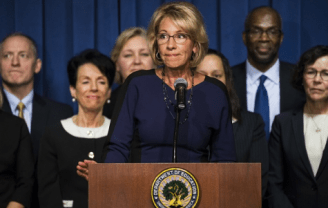The Controversy of Betsy DeVos
March 1, 2017
Trump has made many unusual executive decisions after his recent inauguration, and his educational secretary was one of his many controversial choices. Betsy DeVos is a businesswoman, former Michigan Republican party chairwoman, and chair of the pro-school-choice advocacy group, American Federation for Children. She is Trump’s replacement for Arne Duncan and John King, Obama’s education secretaries.
If there is one issue that summarizes and represents DeVos’s platform, it is school choice. School choice is the concept of the public being able to choose the school their children attend. DeVos believes the current school system is a monopoly that does not allow freedom of choice, competition, or quality teaching. She also advocates for vouchers which are scholarships funded by taxpayer money that can be used to pay for private school tuition.
In addition, she supports charter schools which are government funded but independently owned. These are not heavily favored in America, because they use taxpayer money and are not proven to be more successful in teaching than traditional public schools.
CREDO (Center for Rese arch on Education Outcomes) has recently released a statement in a national study comparing reading test scores of public schools and charter schools, stating that “charter school students now have greater learning gains in reading than their peers in traditional public schools.” However, this conclusion was based on a difference of test scores that was less than one hundredth of one percent which is much too small of a number to garner much support of a cause that involves taxpayer money. Trump’s choice in the education secretary portrays his view towards the public school system.
arch on Education Outcomes) has recently released a statement in a national study comparing reading test scores of public schools and charter schools, stating that “charter school students now have greater learning gains in reading than their peers in traditional public schools.” However, this conclusion was based on a difference of test scores that was less than one hundredth of one percent which is much too small of a number to garner much support of a cause that involves taxpayer money. Trump’s choice in the education secretary portrays his view towards the public school system.
Americans wonder if DeVos has adequate experience in her field. She and her four children have not attended public school, needed financial aid, nor have they taken out student loans. Some feel that her $5.1 billion net worth and lack of an education degree makes it difficult for her to understand the public’s lives and financial positions. During the 2016 presidential election, she supported Marco Rubio and called Trump an “interloper” who “did not represent the Republican Party.” Supporters of Trump’s choice in DeVos say that the decision reflected his “willingness to look outside of his loyalists,” according to Mercury News.
Senators are concerned about DeVos’s understanding of the education secretary position. During her first hearing, Elizabeth Warren, the Massachusetts Senator, asked DeVos if test scores should be a mark of proficiency or growth. DeVos did not seem to understand the question; she answered, “I think if I’m understanding your question correctly around proficiency, I would also correlate it to competency and mastery so each student is measured according to the advancement that they’re making in each subject area….” Her answer was called out, because it clearly defined growth instead of efficiency.
Following the hearing, Warren wrote a 16-page letter highlighting DeVos’s lack of experience. “While past nominees for Secretary of Education have served as teachers, school system leaders, and governors, they came to the Department of Education with deep executive experience in public education, you have held no such position. As such, your nomination provides the Senate and the public with few clues about your actual policy positions on a host of critical issues.” Warren continues to debunk DeVos’s validity by claiming that she has spent millions on for-profit schools “with no accountability for how well these schools serve students.”
![]()

DeVos was selected as the education secretary through a tie-breaker which has never before occurred for the position. All 48 Democratic senators and two Republicans senators (Lisa Murkowski of Alaska and Susan Collins of Maine) voted against DeVos while the remaining 50 Republicans voted for her, so the vice president, Mike Pence, was summoned to make the final call.
DeVos has a very unique collection of ambitions: to increase the popularity of charter schools, school choice, and private school vouchers. While supporters believe that these are good causes, others believe her ambitions do not have enough evidence of success. Either way, the selection of Betsy DeVos was a historical event that was surrounded in controversy.








